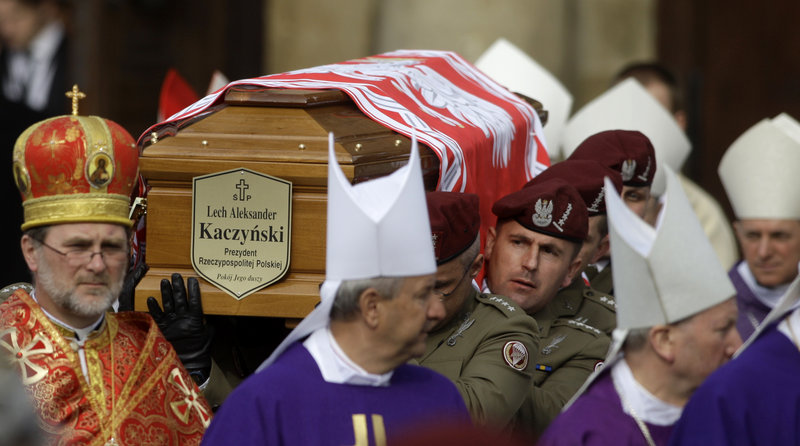KRAKOW, Poland – Tens of thousands of Poles bade farewell to President Lech Kaczynski on Sunday at a state funeral filled with pomp, pride and an outpouring of patriotism that his divisive and unpopular leadership had never generated.
Mourners applauded and chanted “We thank you!” as the caskets bearing Kaczynski and his wife, Maria, were carried slowly past pale-toned Renaissance buildings for burial among kings and poets in the ancient Wawel Cathedral.
“Poles finally appreciate him,” said Ryszard Stolarski, 56, one of many weeping mourners. “I never imagined that Poland would honor Kaczynski in this way.”
Many world leaders, including President Obama and Nicolas Sarkozy of France, could not be there because their travel plans were wrecked by the huge plume of volcanic ash that blanketed Europe.
The funeral came eight days after the Polish air force Tupolev 154 crashed on approach to Smolensk, Russia. The worst tragedy to strike Poland since World War II killed the first couple and 94 other people, including top civilian and military leaders.
In some ways the tragedy, and Russia’s response to it, appear to have begun the long process of finally healing wounds that have soured the two nations’ relations for decades.
Kaczynski, a lifelong skeptic of Russia and fervent anti-communist dissident, had focused on building closer ties to the United States, advocating for a U.S. missile defense base in his country. But even as president, he sometimes pushed diplomacy aside to sharply criticize Russia.
Yet since the plane crash, Kaczynski has become an unwitting catalyst for new words and gestures of trust between the long-divided Slavic nations.
Kaczynski’s fatal flight, which investigators have said was likely caused by pilot error, was meant to take him to a memorial for 22,000 Polish officers murdered by Stalin’s secret police in 1940, killings intended to wipe out Poland’s brightest and best.
The patriotic Kaczynski wanted to honor them and push Moscow to do more to acknowledge the Soviet crimes, which Moscow had blamed on Nazi Germany during the communist era, a cover-up often known as the “Katyn lie,” and given little attention since.
And though many world leaders were kept away by the travel chaos caused by Iceland’s volcano, Russian President Dmitry Medvedev arrived on a jet to pay his respects at the state funeral in the 13th-century St. Mary’s Basilica.
Poland’s acting president, Bronislaw Komorowski, told the congregation during the lavish state funeral for the first couple that Kaczynski’s death has created hope that “we will all know the truth about the Katyn massacre.”
Krakow Archbishop Stanislaw Dziwisz acknowledged those new ties, saying the tragedy had given rise “to many layers of good between the people and nations.”
“The sympathy and help we have received from Russian brothers has breathed new life into a hope for closer relations and reconciliation between our two Slavic nations,” Dziwisz said. “I direct these words to the president of Russia.”
It was Medvedev’s first visit to Poland, and before returning home he declared that the two nations are taking a “step into the future.”
Send questions/comments to the editors.



Success. Please wait for the page to reload. If the page does not reload within 5 seconds, please refresh the page.
Enter your email and password to access comments.
Hi, to comment on stories you must . This profile is in addition to your subscription and website login.
Already have a commenting profile? .
Invalid username/password.
Please check your email to confirm and complete your registration.
Only subscribers are eligible to post comments. Please subscribe or login first for digital access. Here’s why.
Use the form below to reset your password. When you've submitted your account email, we will send an email with a reset code.